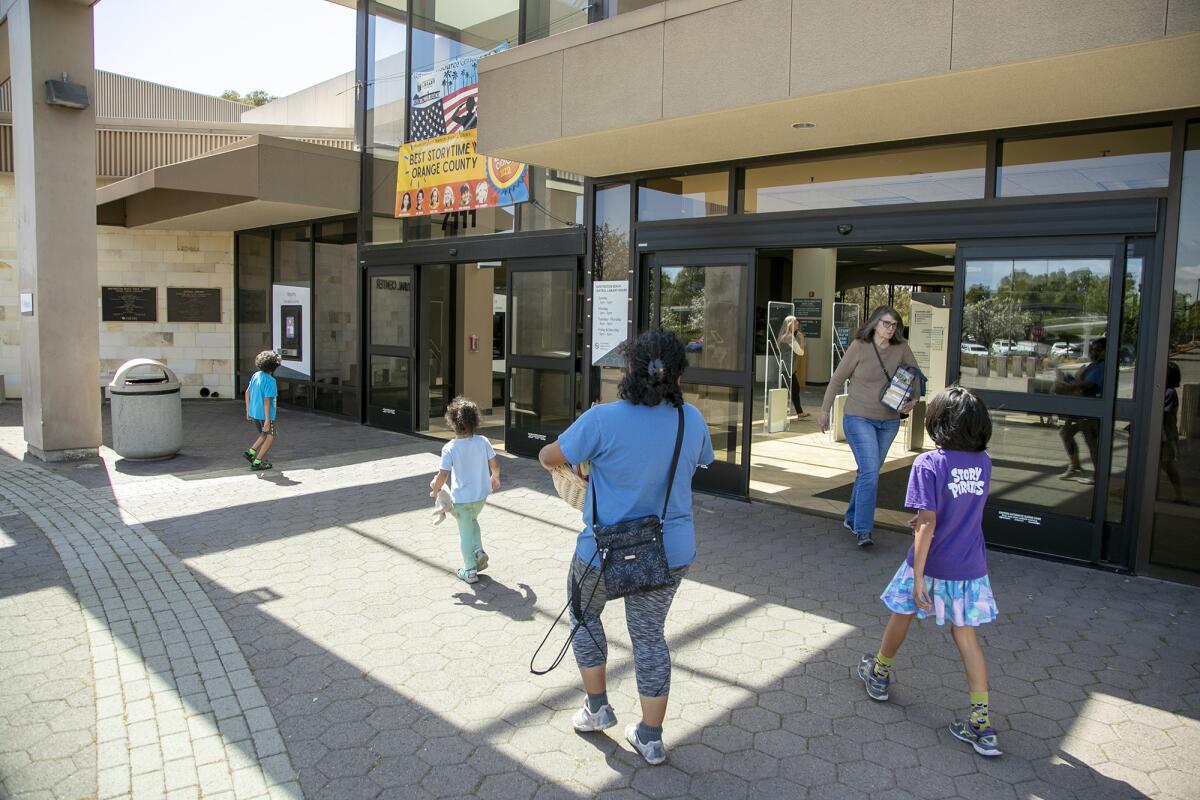Huntington Beach to consider privatization of public library

- Share via
The Huntington Beach City Council will consider issuing a request for proposals for the privatization of its public library when it meets Tuesday.
In a report prepared on the item, city staff said that initiating the process does not mean the city would necessarily act on outsourcing library services but would allow for a possible agreement between Huntington Beach and a third-party contractor for consideration at a later date.
City staff also stressed in the report that the contractor would only operate the facility — not that the city would cede ownership of the library.
“In late 2023, the city was approached by [Library Systems & Services] proposing to deliver managed library services for our library system that would meet the same level of service that currently exists for substantial annual cost savings,” said city spokeswoman Jennifer Carey.
“City staff is asking for City Council for approval to issue RFP, so that we can learn more about managed library services and if it is something that could be feasible for Huntington Beach,” Carey said. “The intent is to gather additional information on these services and the companies who provide them.”
According to the company’s website, Library Systems & Services affirms a city maintains ownership over the libraries and that it keeps a “strong” relationship with local Friends of the Library organizations. It currently operates public libraries in Escondido, Simi Valley and other California cities. In 2022, the company attempted to contract with the city of Fullerton but discussions fizzled out because of a “lack of support from policymakers,” according to notes by the Fullerton Observer in an opinion letter published that March.
Friends of the Huntington Beach Library member Carol Daus said she and her fellow members were not convinced the company will be able to follow through on its promises to the city.
“We’ve known about this for a while. We were concerned, but we weren’t sure if they were doing a research study on this proposal. We’re all familiar with Library Systems & Services,” said Daus, who noted that former Councilman Mike Posey is a regional sales executive for the company. “It’s a very aggressive library privatization company. It’s private and for profit ... so it’s not very transparent. We do know enough about LS & S’s branches around the country and their collections were decimated.”
Daus pointed to the Escondido Library, where volunteers said in a story from the San Diego Union-Tribune in May 2021 that Library Systems & Services “relentlessly” purged the library’s shelves in the years following the City Council’s vote to outsource operation of the city library to the company in 2018.
“In the end, [Library Systems & Services] has to give returns to their investors. To make that work, you need to cut. To have that happen to [the Huntington Beach Public Library], which is about to have its 50th anniversary in its location — it’s the crown jewel of the city outside of the beach,” said Daus. “People love our library. It’s ranked highly for its services. But to have something like that turned over to a for-profit corporation, we’re just aghast.”
She said that she, and other members, were unsupportive of the move because they felt the cost savings are negligible when compared to how much the Friends of the Huntington Beach Library contributes in donations and volunteer labor.
The agenda item comes as other changes have affected the city’s library system. Librarians at the Huntington Beach Public Library started recataloging books in February after a controversial ordinance passed last October allowed for a parental advisory board to determine which childrens’ books are allowed to appear on shelves.
“We feel like it’s a very odd decision after everything they’re doing with censorship, book relocations — it seems like it’s more performative,” Daus said. “It seems to be something that’s more political than rational.”
All the latest on Orange County from Orange County.
Get our free TimesOC newsletter.
You may occasionally receive promotional content from the Daily Pilot.




